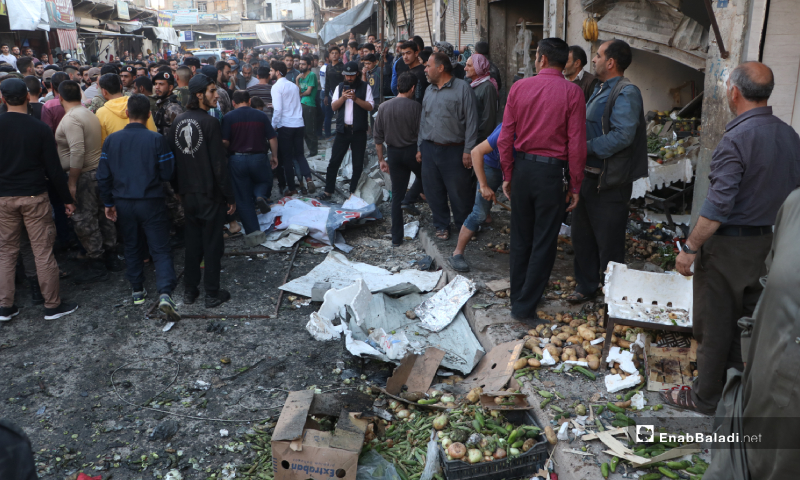Explosions rock every now and then different areas controlled by the opposition factions in northern Syria. These explosions have adverse consequences on various places, the last of which took place on 29 April in the northern Syrian town of Afrin, which is controlled by the Turkish-backed opposition factions.
Enab Baladi monitored seven explosions; an explosion occurred in Idlib, another one in Ras al-Ain, west of al-Hasakeh province, but five blasts, which were described as the bloodiest, took place in the countryside of Aleppo.
These never-ending explosions claim many lives of innocent civilians in the opposition-controlled areas.
The local councils and security forces in the northern countryside of Aleppo took numerous actions, fearing the repetition of the scenario of the Afrin bombing, which killed more than 40 people.
These measures are taken to prevent the entry of all vehicles, which are not registered in the transportation departments and do not have digital license plates issued in the area.
The local council of Akhtarin, for example, will be preventing motorcycles from entering certain areas, which will be closed by the security forces. The security forces have not announced the closed areas until the time of publishing the report. The local council will also prevent the overnight parking of large trucks within the main streets of the town and in front of directorates, mosques, and institutions.
For its part, the local council in the city of Azaz, in the northern countryside of Aleppo, declared the commercial market in al-Salama municipality as a security zone and interdict the passage of any vehicles without being subject to search as part of security procedures.
The local council in the town of Suran, northeast of Aleppo, also finished installing surveillance cameras in the main roads and streets of the town, on 13 May.
Are increased security measures enough to prevent bombings?
In a poll conducted by Enab Baladi, on the adequacy of the security measures taken by the local councils and the police command in the northern countryside of Aleppo to prevent the explosions, 90 percent of the 302 users voted “No,” while 10 percent said “Yes.”
The poll results were confirmed by Abdul Qader Abu Yousef, the director of the Azaz Media Office, in an interview with Enab Baladi. Abu Yousef said that the already taken measures are not fully implemented, due to a flaw in the security procedures, and their insufficient time distribution always to meet the security need.
In the morning, lax security prevails while in the evening, stricter measures are taken, which gives the perpetrators of the bombings to move freely at certain times of the day, according to Abdul Qader Abu Yousef.
In fact, security measures are neglected in some parts of cities, while the tighter security is taken in the centers and road intersections. All this causes a security threat.
Enab Baladi interviewed a group of people in the eastern and western countryside of Aleppo. Most of them agreed that the procedures were insufficient, as evidenced by the continued explosions that kill civilians.
They requested to increase efforts and security measures on the checkpoints, controlling and monitoring the military vehicles in particular, which should have military registration plates issued by the transportation departments or the Turkish-backed Syrian National Army (SNA).
Some people also stressed the necessity of activating camera surveillance systems and preventing unregistered motorcycles from entering their areas, especially to the markets.
Among the points agreed upon by those who spoke to Enab Baladi is the need for coordinating between the local councils, the SNA, and the security forces, supporting the police sector and conducting patrols at all times.
People also have a role
The minister of defense in the “Syrian Interim Government (SIG),” Major General Selim Idris in a meeting with the Moral Guidance Department of the SNA on 5 May said that ensuring the security of areas controlled by the opposition factions needs an integrated security system, which operates based on a security plan.
The achievement of that requires close cooperation between the SNA, the Civil Police, citizens, due to the situation which differs from that in the systems of stable countries.
According to Idris, the SNA should “step up the security on the contact lines, set up ambushes in potential transit areas, and provide the crossings with round-the-clock surveillance cameras and explosive detectors.”
He also called for performing more detailed inspections of vehicles and individuals entering the SNA-held area when they are open, at the entrances of towns and cities, in addition to strengthening intelligence oversight.
However, the minister of defense pointed out that booby-trapped motorcycles and cars do not have to have entered from the crossings, but rather may be equipped inside, which requires the presence of a reliable and organized intelligence apparatus, and cooperation between residents and security agencies to uncover such actions before they happen.
In an earlier interview with Enab Baladi, Brigadier General Adeeb al-Shallaf, the former commander of the “Free Police” in Aleppo, and Mahmoud Habib, a member of the media office of the “ Northern Democratic Brigade” in Raqqa province, which is linked to the “Syrian Democratic Forces” (SDF), agreed that the security forces are not the only ones responsible for providing security, but all institutions and civilians should work together to stop bombings.











